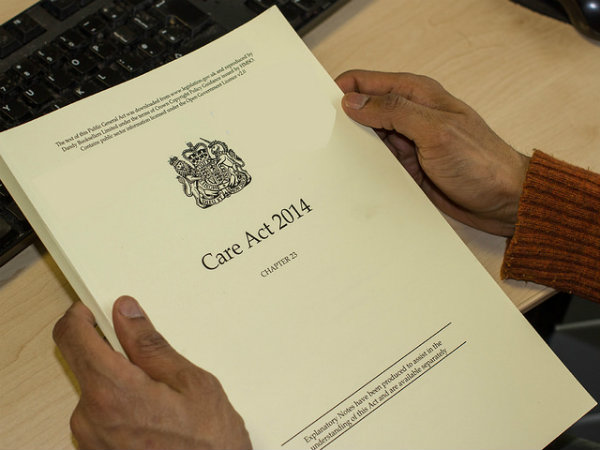
Local authorities are denying people sufficient “choice and control” over the care and support they receive under the Care Act 2014, according to research published last week.
A review of Care Act materials produced by local authorities found that councils “generally” failed to give people adequate information about their rights to different care options locally. The situation left people unable to exercise sufficient choice and control over their care, despite this being a core principle of the act itself, researchers found.
The study, carried out by the Independent Living Strategy Group and published by the charity In-Control, marks one of the first gauges of how the Care Act has been implemented since the legislation came into force on April 1.
The act places a duty on councils to provide information and advice for all people in their area. The statutory guidance underpinning the legislation states that this must include the choice of types of care and support, and the choice of care providers, available locally.
Under the legislation, all service users assessed as having eligible needs are entitled to a personal budget. But InControl’s review found that this entitlement was ‘rarely emphasised’ in quick guides to the Care Act produced by some councils.
Researchers also found evidence of some local authorities inferring that people opting to have their personal budget managed by the council would have less control over how it was spent than if they chose to receive a direct payment. The Care Act guidance states that the way a person opts to manage a personal budget should put “no constraint” on how their needs are met as long as “this is reasonable”.
Official figures show that in 2014-15 most people supported in the community by local authorities had a council-managed personal budget (57%) and just 24% received a direct payment. Among people aged over 65, 65% of community-based clients had a council-managed personal budget and 20% had a direct payment.
The researchers also asked people in receipt of care and support about their experiences of services over the year prior to the Care Act coming into force.
Of 399 people who responded to the survey, almost half felt their quality of life had reduced and almost a third (30%) said that they had experienced a reduction of choice and control. Some 29% reported restrictions being placed on their use of direct payments or personal budgets, with 14% limited to choosing their care from a shortlist of providers. The study authors said these limited lists are at odds with the “vision of personalised care” underpinning the Care Act.
The researchers acknowledged that councils were “struggling to adjust to unprecedented cuts” but said providing more choice and control to people should be embraced as a “much-needed solution” to the challenges facing social care.
Disability researcher Jenny Morris said there was a “yawning gap” between the principles of the act and how it was being implemented in practice.
“Personal budgets were supposed to enable everyone who needed social care support to have the kind of choice and control that was previously only open to those receiving direct payments. Instead, they have been rolled out in the context of a major financial crisis facing adult social care, and the result is not only a reduction in choice but also a decrease in the quality of people’s everyday lives,” she said.
“This is the government’s responsibility and they must act.”
In a bid to help local authorities meet their Care Act obligations, In-Control has produced a checklist of information for people receiving care and support.
The survey also provided an insight into the experiences of some people who had been supported by the Independent Living Fund prior to its closure in June of this year. Of the survey respondents who were transitioning from ILF to council support, 14.5% said they had been told they should expect less support in the future while most (56.5%) had not been told whether their support would change.


 Bournemouth, Christchurch and Poole
Bournemouth, Christchurch and Poole  Hampshire County Council
Hampshire County Council  Lincolnshire County Council
Lincolnshire County Council  Norfolk County Council
Norfolk County Council  Northamptonshire Children’s Trust
Northamptonshire Children’s Trust  South Gloucestershire Council
South Gloucestershire Council  Wiltshire Council
Wiltshire Council  Wokingham Borough Council
Wokingham Borough Council  Children and young people with SEND are ‘valued and prioritised’ in Wiltshire, find inspectors
Children and young people with SEND are ‘valued and prioritised’ in Wiltshire, find inspectors  How specialist refugee teams benefit young people and social workers
How specialist refugee teams benefit young people and social workers  Podcast: returning to social work after becoming a first-time parent
Podcast: returning to social work after becoming a first-time parent  Podcast: would you work for an inadequate-rated service?
Podcast: would you work for an inadequate-rated service?  Family help: one local authority’s experience of the model
Family help: one local authority’s experience of the model  Workforce Insights – showcasing a selection of the sector’s top recruiters
Workforce Insights – showcasing a selection of the sector’s top recruiters 

 Facebook
Facebook X
X LinkedIn
LinkedIn Instagram
Instagram
As an ICAA this does not surprise me in the least, my view of the Care Act is that it looks like a great piece of legislation but implementation of it means it will not become the great piece of legislation it could be.